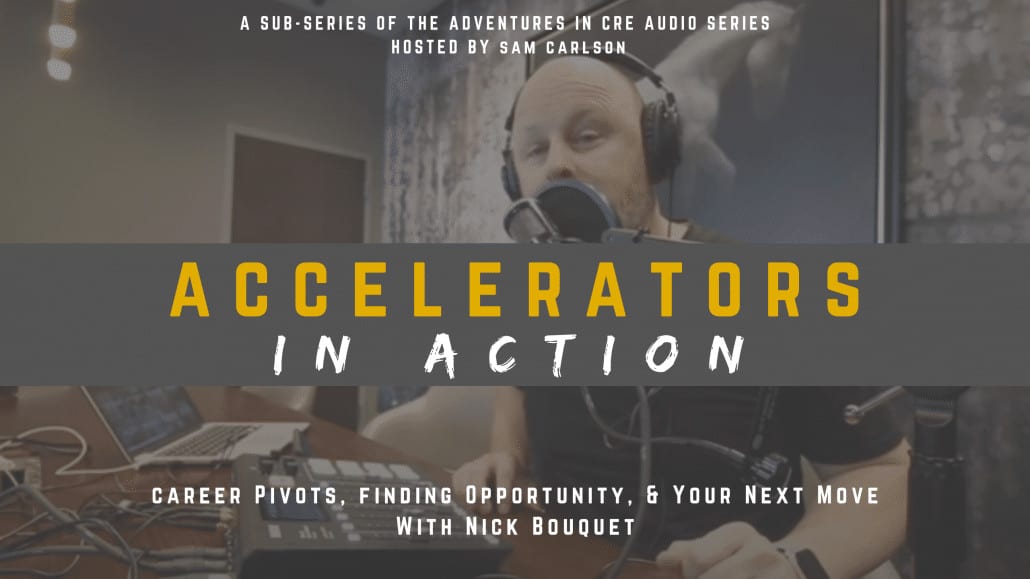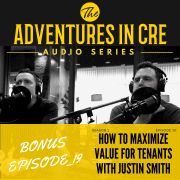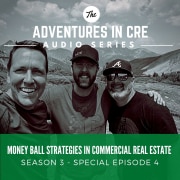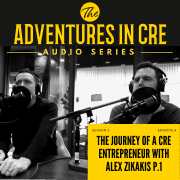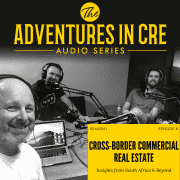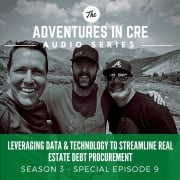Career Pivots, Finding Opportunity, and Your Next Move with Nick Bouquet – AiA
At some point in their career, most real estate professionals choose to pivot. No matter whether that means making wholesale career change (e.g. transitioning into real estate from another industry), or simply moving from one property type to another, these career pivots can be difficult to navigate.
In this episode of the A.CRE Audio Series, Sam welcomes real estate developer and Accelerator graduate Nick Bouquet. Nick is a 15 year venture of real estate investment and development, including 12 years developing over $250 million of affordable housing projects. Nick is familiar with career pivots, having navigated one himself. And so in this episode, he shares his insights on how to successfully transition to new opportunities.
Currently, Nick executes on redevelopment opportunities in the United States. His responsibilities span the development life cycle. From identifying, analyzing, and performing due diligence on potential investments, to securing entitlements and overseeing the entire construction process. A huge thank you to Nick for sharing his career story.
This is our 4th episode in a growing sub-series of interviews with commercial real estate professionals. This Accelerators in Action sub-series tells the stories of CRE professionals at all stages of their career, from students to senior-level professionals. Their experiences will provide you with insights into how to take your real estate career to the next level.
Listen to this Episode – Career Pivots, Finding Opportunity, and Your Next Move with Nick Bouquet
Resources from this Episode
- Adventures in CRE: https://www.adventuresincre.com/
- View our CRE Career Resources: https://www.adventuresincre.com/careers/
- A.CRE Accelerator: https://www.adventuresincre.com/accelerator/
Episode Transcript – Career Pivots, Finding Opportunity, and Your Next Move with Nick Bouquet
Sam Carlson (00:00):
Hello and welcome back to Accelerators in Action. Today, I am joined by Nick Boquet. We’ve got an amazing podcast for you. In fact, we’re talking about pivoting, we’re talking about career changes, and we’re talking about what’s happening right now, so let’s get started.
Sam Carlson (00:17):
Making your mark in commercial real estate is a journey best travel with grit, determination, and a mindset to take action. To most, success at the highest levels is a fleeting thought and an unrealistic expectation, but to others, opportunity boils down to focus, preparation, and a lifelong commitment to learning and improvement. Join me as I take you into the lives of those unwilling to leave their success to chance and instead take complete control of their futures. These are action-taking, limit-breaking, never-faking accelerators in action.
Sam Carlson (00:52):
All right, welcome back to the podcast. Like I said in the intro, I’m really excited to have Nick on the podcast today. We got a minute to speak before the podcast to get to know each other and see what Nick is doing, what he’s done in his awesome career so far, and what the future holds for him as he prepares and plans and just does a lot of really cool stuff. With that, Nick, thanks for being here, man.
Nick Bouquet (01:26):
Thanks, Sam. I’m pumped. I’m looking forward to this.
Sam Carlson (01:28):
Yeah, it’s going to be a lot of fun. For the listeners, for people chiming in, I always like to start with the backstory, who you are, both personally, we’ll do that first, and then professionally as well, a little bit about your career. Let’s start there and then we’ll go from there.
Nick Bouquet (01:45):
Sure. Sounds great. I grew up in a small town in Maine. I’ve had an interest in business for most of my life. I still live in New England. I live in Portsmouth, New Hampshire now with my wife and my 18-month-old. That’s been a fun recent adventure and addition for me. I ended up attending Bentley College outside of Boston, Massachusetts, with a interest in pursuing business in general, no particular sense yet. I really wasn’t even aware of real estate investment or development as an industry at that point. As my first summer rolled around while being at Bentley, I ended up gravitating toward construction work in that first summer and that really was maybe the first seed that got planted in my mind of building and finance, maybe how all that could come marry together.
Nick Bouquet (02:49):
Fast forward a few years in Bentley, I never attended a traditional job fair, I’ve never had a traditional internship with a large bank, large accounting firm, large business. Then my senior year, I was in one of my business management classes and we had a presentation from a venture capital firm. I ended up working out a way to get an internship with that firm. I was also at the same time my senior year spending two days a week on a large downtown Boston mixed-use commercial project doing construction fieldwork, so I had this interesting blend of seeing VC deal work and learning the finance side of business and also watching a quarter-billion-dollar building being built in downtown Boston.
Nick Bouquet (03:43):
I have this distinct memory. I was on the project one day in Boston and my superintendent came over to me. The owner, the developer happened to be on site that day. He pointed him out to me and he said, “You don’t want to be us. You want to be that guy.” That, to me, was one of those life-pivoting moments where all the things come together and the lights go on and you say, “Wow, this is pretty cool. That guy, his company are putting together this huge project in Boston.”
Nick Bouquet (04:18):
I didn’t quite know yet how to connect the dots on that and I certainly didn’t get there right away, but I ended up graduating college without a job because I was still interning at the VC fund hanging on and hoping that they’d given me a job. That ended up happening, which was great. Took me about six more months of making $10 an hour as an intern, but I got there. I spent two years working for those guys.
Nick Bouquet (04:47):
Then it was 2006. As you recall, the real estate world was still booming. I had made the mental commitment and emotional commitment to figure out a way to transition into commercial real estate. This is a wild story, but I posted my resume on Monster, started to seek out development firms that I thought might want to hire someone with my skillset, and one of the CEOs we were investing in had done a background search on the employees of the VC fund, found my resume, and ended up basically getting me fired.
Nick Bouquet (05:30):
He forced my hand, so I left that job summer of 2007. I moved back to Portland, Maine, which is the big city in Maine, beautiful city, amazing place to be as a young person, really, anyone now. It’s just really blossomed over the last 15 years. I started just calling developers who I thought were big enough to hire an analyst-level person with a broad construction background and three years of real active VC work under their belt.
Nick Bouquet (06:04):
I think anyone trying to find a job in CREs probably learned it’s a pretty tricky world to get into, but I did find a few developers who were at least willing to take a meeting with me. Those did not translate into jobs, but they did end up connecting me to a group of affordable housing developers who were looking to hire a junior person, associate, analyst-level person. They took a chance on me and I ended up spending 12 years in that industry, starting as an analyst associate and ending up as a partner.
Nick Bouquet (06:42):
At the time, I didn’t really even know that the affordable housing business was a robust development investment vehicle in commercial real estate, but just a tremendous place to start. Did about a quarter-billion-dollars worth of deals with those guys in that period of time, about 3000 units of housing with complexity of complex tax-credit-type executions, just a great way to get a big, deep foundation of real estate experience under my belt.
Sam Carlson (07:14):
Well, we glazed over a ton of good stuff there. I mean, that story from beginning to finish is, well, not to finish, we’ve got more to go, but that story so far is pretty good. I mean, you think of the defining moments in people’s career and you start out with… I can’t believe you got fired. That is bizarre. Somebody found your resume on Monster and they said, “Hey, this guy’s looking,” and they fired you for it. Is that the gist?
Nick Bouquet (07:48):
Basically, the partners at that VC firm were very fair and good about it, but they were like, “Look, if you’re looking to make a transition, we’re glad we know that now. We’ll give you a few months to sort your life out, but you do ultimately need to go.”
Sam Carlson (08:09):
Yeah. Forced your hand, I mean, that’s not a bad thing. Some-
Nick Bouquet (08:14):
Yeah, exactly. No, and-
Sam Carlson (08:15):
… Yeah, go ahead.
Nick Bouquet (08:16):
… I was going to say, I tend to view moments like that as opportunities in life. As a young guy, I was 24, very little life commitments ahead of me at the moment, so I just figured I could figure it out. It was really the first time in my life where I had to bet on myself and just make something happen for myself in a way that actually mattered because I needed to have a job and wanted to have a job. Yeah, it was the push that got the whole ball rolling for me.
Sam Carlson (08:52):
Yeah, we’re recording this particular episode, it’s the 17th of April right now. We’re obviously in the midst of some pretty hard times. I mean, this is something that we haven’t as a country collectively faced in my lifetime. I mean, I’m 40. This hasn’t happened for a very long time. I think a lot of people, when things like this happen, they get scared and they maybe lose a sense of direction in what they should be doing.
Sam Carlson (09:25):
The same thing, I want to go back to how you got into the affordable housing job, because you wanted to get a job in commercial real estate. You knew that, “Hey, in order for me to do that, it’s not going to come to me, I’m going to have to go after it,” right? I think a lot of times, that effort and that consistency is what really ends up making the successful people successful, ultimately, because unless you have this huge pedigree of people that can just put you in a position and you’ll just rise through the ranks by virtue of your name or whatever the case may be, which there is that, if that’s not the case, then you have to go out and do it.
Sam Carlson (10:14):
Talk to me a little bit about how, I mean, it sounds like you went to a lot of developers and ultimately one thing led to another. Talk to me about that process. I mean, it’s not like it’s a glorious thing to take all these meetings and basically have people say no, but eventually, something did turn in your favor. Talk a little bit more about that. How did that ultimately pivot into your first position?
Nick Bouquet (10:38):
Sure. I benefited a bit from I didn’t know what I didn’t know.
Sam Carlson (10:44):
Yeah. I love that, yeah.
Nick Bouquet (10:50):
I still do in a lot of ways in my life, but it literally started with a simple Google search, “Maine real estate developers.” The state of Maine actually had at the time a database of a development organization and the key members of that organization. There was 30 or 40 on that list and I just started going through them all and seeing if they had websites and seeing if they were big enough, again, to maybe hire a junior guy. Then it was just a matter of effort and energy, emails, calls. I found some great people who were willing to take some time and just share with me what they knew about the landscape, the industry, how they got into the business, and just help give me some ideas of how I could find my foothold.
Sam Carlson (11:46):
It’s really interesting you say that because when I… How old were you when you did that?
Nick Bouquet (11:52):
24.
Sam Carlson (11:52):
Okay. I was 24 when I did the exact same thing. Basically, what happened for me is I knew I wanted to get into the world of finance with real estate. I did that by becoming a lender, okay, an actual originator for home loans. When I came in, I was 24, nobody really… It was 2014, so that was, again, like you said, I mean, people were making a lot of money in mortgages back then. Nobody really had the time to train me, nobody had the time to really spend in me, but they were willing to hire me because opportunity was abundant.
Sam Carlson (12:34):
I got in and the first thing I had to do was figure out, “How am I going to get all of this business?” What I would do is something very similar to what you did. I would go to a restaurant or a public place where they have those real estate magazines, you know what I’m talking about? Where you look, where-
Nick Bouquet (12:55):
Sure.
Sam Carlson (12:56):
… Yeah, like a Homes & Garden or something like that. I would grab those magazines and then I would look through them and I would start looking at the types of properties these real estate agents were listing and I would start doing some due diligence on each one of them and see who is a person that I could really add value to. How can I craft my skillset and my story to dovetail into their business? Ultimately, that’s what led me into a very nice client base and a successful mortgage company after a couple of years.
Sam Carlson (13:33):
It’s so funny. It was the exact same thing: I didn’t know exactly where to start, but there was this place I knew where I could find them and then I just created my own creative introduction to them and the dialogue started that way. Like you said, one thing led to another and I started getting clients and opportunities. I commend you for that. I think anybody listening, the real thing that I think is happening here is the only thing that controls the outcome is you. You control the action, right? Just like you did in your story.
Nick Bouquet (14:09):
Yep.
Sam Carlson (14:11):
I want to talk a little bit about your experience and your time in the affordable housing. Talk to me about that particular niche, what you liked about it, why you decided to pivot out of it. Let’s start there.
Nick Bouquet (14:28):
Sure. When I first got into it, again, I wanted to know it existed, but then when I got into it… I got the job offer, I took it because I simply just wanted to start somewhere. My original thinking was, “I’ll work here for a couple of years, I’ll gain some experience, and then I’ll move back to the conventional market-rate development world.”
Nick Bouquet (14:55):
Then 2008 hit, obviously, and that whole world changed, all of the CRE industries changed. By that point, I had really come to like and enjoy the affordable housing business. You like to think in all development, you’re creating a product that serves some kind of need or good, but affordable housing I think is really one of those products where you are doing a lot of good and you’re able to make a living doing it and you’re able to do real estate deals. That appealed to me.
Nick Bouquet (15:31):
At the time, it was certainly more of a niche industry than it is today. We were one of a handful of companies who were able to execute at the level we were able to execute that. We just had the ability to do a lot of transactions. I enjoyed the complex financial structure of those deals as well as the whole regulatory aspect that you have to navigate within, too. Real estate, to me, regardless of the project, is really always a public-private partnership in a way because nothing gets done in real estate without getting the buy-in from the community in a lot of ways. I just really liked that whole aspect of the industry.
Nick Bouquet (16:19):
As my career progressed through it, I always had an interest in market rate, conventional work, but 10-plus years went by and I was still in the affordable housing business. That business has changed in the last few years. At least, that’s my observation and opinion. Really, what happened about five or six years ago as commercial real estate prices, particularly multifamily, nationally really began to explode. We began to see a lot of non-affordable housing people and private equity money flow into that marketplace.
Nick Bouquet (17:00):
That really changed the dynamics of the industry in a way that the business model that we operated under. It really almost became obsolete in a way, really in the sense that the risk/reward ratios really were no longer there for myself and my partners. It doesn’t mean we weren’t still pursuing deals and doing deals and trying to find new ways to create affordable housing product, but certainly what got us here. Wasn’t going to get us there, if that makes sense.
Sam Carlson (17:31):
Yeah. Yeah, absolutely.
Nick Bouquet (17:34):
I was just at a point professionally where I was looking to make a pivot and try something different, so about six months ago, I took a VP of development role with a group of local investors here in New Hampshire who have the large portfolio of property, as well as a variety of other businesses. They brought me on to, sorry, run their real estate group and scale that business monetize and optimize the existing portfolio. I left a partnership situation where I was an owner to take this sort of leap and risk into a different aspect of real estate, as well as becoming an employee again for the first time in a long time.
Nick Bouquet (18:25):
That was going great until this COVID issue hit. The guys who I worked for have effectively temporarily suspended their real estate activities to focus their equity allocations on their other businesses. I’ve been furloughed as of three weeks ago. I’m, again, at a pivotal transition point and reflection point in my life where I’m investigating what’s next for me.
Sam Carlson (18:54):
Well, that’s really interesting. Obviously, we appreciate you sharing that. I mean, we get emails every single day, so you are not the only one that is in a position like this, I don’t think that. Across other industries, this is happening everywhere. It’s less about what’s happening now more about what are we going to do about it.
Sam Carlson (19:18):
Let’s talk about a couple of things. One is the skill stack. As far as your skill stack, what are your strengths and what do you see your value-add to …? I mean, whether you’re a partner, if you do your own things, what would be your value-add to investors? Talk about where you see that right now and how you’ve developed that.
Nick Bouquet (19:43):
Sure. Really, my expertise is in, I guess would call it value-add multifamily product because that’s really what we did in the affordable housing business, albeit we financed it with different resources than you would conventional market-rate value-add product, multifamily product. My role in that capacity was really as a sponsor and a true investor/developer/owner where I’m doing everything from sourcing deals to due diligence, underwriting, closing, financing, and construction oversight as well.
Nick Bouquet (20:27):
My toolset is, soup to nuts, multifamily value-add development, as well as I have experience in new construction and the whole permitting and entitlement side of the business as well. I’ve got a lot of confidence around my ability to either do that for myself or do that for another group or some hybrid of those two things.
Nick Bouquet (20:56):
Getting there took me… I probably wasn’t confident at the level I am now until seven or eight years into my career. This business takes a long time to learn. It just takes a lot of reps and a lot of deals. Every deal is different. They’re all kind of the same, but they’re all very different, particularly if you stick to one niche, which, someone starting their career, or if they’re in the middle of their career, I would certainly. I think it’s important to pick a food group in real estate and really, really do your best to become a student of that food group and what makes that particular asset class tick.
Nick Bouquet (21:41):
I had fantastic partners and mentors in my affordable housing business who were not only and are not only exceptional guys and really taught me a lot about how to operate as a person and a businessperson, but they were willing to teach and willing to be patient. I picked it up well, but I put a ton of effort into it. I think that just goes without saying, that I think if you do anything long enough and you put enough reps into it, you’re going to become world-class at it. You may not be the best ever at it, but you’re going to be better than 90% of your competition. It’s just a matter of continuing to be curious and continuing to practice.
Nick Bouquet (22:22):
I found Adventures in CRE when I was thinking about making that pivot into conventional market-rate world because while I know how to underwrite and model affordable deals, I wanted to broaden that skillset and be able to produce a more thorough institutional-level thinking and analysis into multifamily product.
Sam Carlson (22:51):
It’s interesting because by the time this episode comes out, it will probably be in the middle of May or towards the end of May. We just did a bonus episode for season two of the Adventures in CRE audio series. I think it was called Multifamily in a Post-COVID World, something like that. It was a really good discussion, excuse me, between myself, Spencer, and Michael, and then a guest, Lane Bean. It was fantastic. We talked about a lot of different things as far as the modeling side, what types of metrics, and what types of things will need to be adapted for the future. We talked about that. That’s more of a tactical approach to the modeling side.
Sam Carlson (23:41):
But then one of the things that I couldn’t help but think the whole time just as, as I observed, and you went through the 2008 recession, all that stuff while you had a career, so did I. One of the things that I am noticing right now, and I feel like it would be an appropriate time to maybe even just share it. Now, it’s just, I think right now, because real estate, money investing, this is all a relationships business, a hundred percent, okay?
Nick Bouquet (24:14):
Sure, yep.
Sam Carlson (24:15):
I think the real people, like if we want to talk about proactive plans and things like that, it’s really hard to make concrete plans about what our next move is. That’s a hard thing to control right now. Maybe, too, by the time this is live, that’ll be more clear, but right now today, when it’s April 17th, that’s hard to do, but one thing that you can control and that anybody out there can control is a proactive approach in your communication.
Sam Carlson (24:46):
What do I mean by that? Wherever you’re at in the commercial real estate world, whether you are an investor, whether you’re a GP, an LP, or an employee, whatever it is, there’s all of these problems happening right now, all right? The people who communicate the best and the people who provide a confidence and provide a plan and are doing the very best at communicating with their particular audience, those are the people that are going to win, okay? “How can I help you?” Those are the messages that are going to resonate.
Sam Carlson (25:28):
There’s a lot of people, in fact, there’s a lot of general partners right now that are handling this entire situation horribly, meaning they’re making moves and whether or not they’re the right move doesn’t matter, what matters is bringing the audience that you have and the people that you network with because this is a relationship business, bringing those people onto the same sheet of music so you all know what’s going on and why, right?
Nick Bouquet (25:56):
Mm-hmm (affirmative), sure.
Sam Carlson (25:57):
I think a lot of this, maybe we don’t have the exact steps as we move forward. We’ll talk about your next moves and some of your thoughts into that. I know there’s some flexibility there, but I just think that people so often just sit back and they wait for things to happen instead of not doing them and instead of not taking control. People notice that. Because we’re all in the relationship thing together, we’re going to identify and we’re going to want to be with those people who are A, communicating proactively and B, providing a palue… Not palue. A pathway to value. That’s a palue, if you didn’t know. A pathway to value, because we have problems, they need solving and people like you, Nick, are the people that will solve those problems.
Sam Carlson (26:54):
Let’s pivot into that. What are your thoughts? What are your next moves? We’d love to have you back, too, because I guarantee you, you’re the guy that went to all the developers and took opportunity by the tail and grabbed it. Talk about your next moves and what’s next for you.
Nick Boquet (27:13):
Sure. When I got the furlough call, obviously, I had a variety of emotions, I was a little shocked. After that all wore off, the light bulb went off and I was like, “This is probably a huge opportunity for me if I choose to frame it that way.” I just immediately started thinking about and creating a list of all the things I could do with what I knew how to do.
Nick Bouquet (27:44):
I brought it to my wife that night and she’s like, “It’s literally been a day or two. You need to just stop and reflect on this for a little bit before you rush out into something new.” I’m still in the middle of that process, but regardless of what happens in the short term and multifamily, I’m incredibly bullish on the asset class as a whole. I will end up doing something in that capacity, residential multifamily, whether it is doing smaller new construction projects in my backyard, my local market, or putting together my own syndication platform and doing larger value-add multifamily syndication transaction, similar to what I did in the affordable housing world, but in a market-rate setting.
Nick Bouquet (28:47):
I think this is a very opportunistic time for groups who can communicate well, as you pointed out, with the variety of the folks that they interface with, and also groups that can execute and that are well-capitalized. I think it’s going to be another fantastic opportunity in real estate. We’ve all been waiting for it for a long time. It’s not fun being in the middle of it, but I think if we can all be patient and step back from being reactionary to the circumstances immediately in front of us, I think if you can do that, you’re going to see things that others aren’t seeing and you’re going to be able to capitalize on that vision. If you can go out and execute, I think you’re going to find a lot of opportunity out there.
Sam Carlson (29:31):
I think you’re right. You touched on a couple of things there and just, I want to share a couple of just things I’ve learned over my career and that is: Whenever things like this happen, there’s always a host of responses to them. Most of them are subconscious, meaning people just do things without really much thought into it. The fact that you’re taking in a bunch of data and then giving your time to sort through it and then come with an actual plan after that, that’s the right thing to do, ‘kay?
Nick Bouquet (30:04):
Yep, of course.
Sam Carlson (30:04):
The second thing is: Always focus on the source problem, never the symptom. When we go back into whatever, if multifamily looks the same, fine, but chances are, there’s going to be some nuanced differences and the people that figure out where things are going are the ones that are going to profit and basically benefit from those changes first.
Sam Carlson (30:33):
The way you do that is by instead of focusing on the symptoms, you list the symptoms and then you try and focus on the source of the problem. The source of the problem isn’t that we had a pandemic and that created the problem, that’s a very obvious problem. The source is something more, “Hey, we had always operated under the assumption that these particular fundamentals operated this way.” That’s the source cause. We need to now look at the second and third-order consequences of all of the sources that we’re looking at, okay? In those, you’ll start identifying problems that you can now solve that other people haven’t identified because all they’re doing is dwelling on these symptoms: “Oh, man, our vacancy rate,” or whatever the symptom is, it’s always a symptom of something else, right?
Nick Bouquet (31:27):
Sure, yep.
Sam Carlson (31:29):
That’s the beautiful thing. You’ll have all that time to, to reflect and hone in on those problems and eventually, when you find the problem that you can solve, you can take that to an audience, whether that’s an investor, another company, whatever it is, and you can convey that information to them and they’ll say, “Whoa, he’s exactly right.” That’s the next rung in the ladder for you. I’m excited to hear where this thing goes. We’d love to have your back, but before we conclude here, I do want to ask you for one piece of advice or any experience that you could share before parting that you consider, “Hey, this was one of the best piece of pieces of advice I ever got.”
Nick Bouquet (32:18):
Yeah. I’m trying to think. I don’t have a specific quote or piece of advice, but I can just simply say that, and I’ve done this, this is now my third time in my career, but I’ve done it twice successfully is embracing the unknown and stepping into uncertainty is really the only path to growth. It’s certainly not always fun, it’s certainly messy, and it can be painful emotionally, but it really is. If someone out there, if you’re feeling stuck, I think you need to bet on yourself and figure out what you know, what you don’t know, and how do you close that gap or who can you leverage or bring in to help solve that on your own solution there. Really, it’s just about moving forward and chunking things down into the next easiest actionable task and trying not to get overwhelmed and just keep moving forward.
Sam Carlson (33:13):
Yep. That’s awesome advice. Well, Nick, this has been awesome, man. Thank you so much for being here and everybody for listening to this podcast. Hopefully you’ve enjoyed it. We will see you on the next one.
Nick Bouquet (33:25):
[crosstalk 00:33:26].Sam Carlson (33:26):
Thank you for tuning in to this episode of Accelerators in Action. For show notes and additional resources, head over to www.adventuresincre.com/audioseries. Would you like to learn real estate financial modeling in a matter of weeks and do it with zero guesswork? If so, the ACRE Accelerator is for you. The Accelerator is a step-by-step case-based program designed to teach you exactly what you need to know in the order you need to know it so you can gain both the knowledge and experience to take your career to the next level. To see if the Accelerator is right for you, go to www.adventuresincre.com/accelerator.

